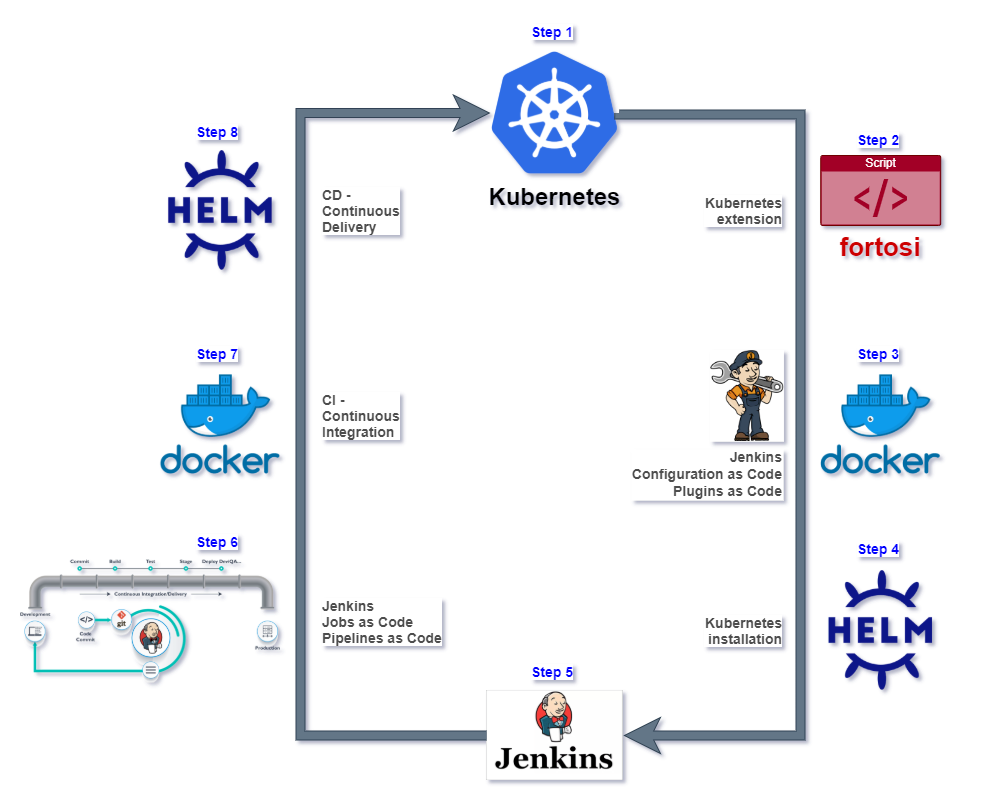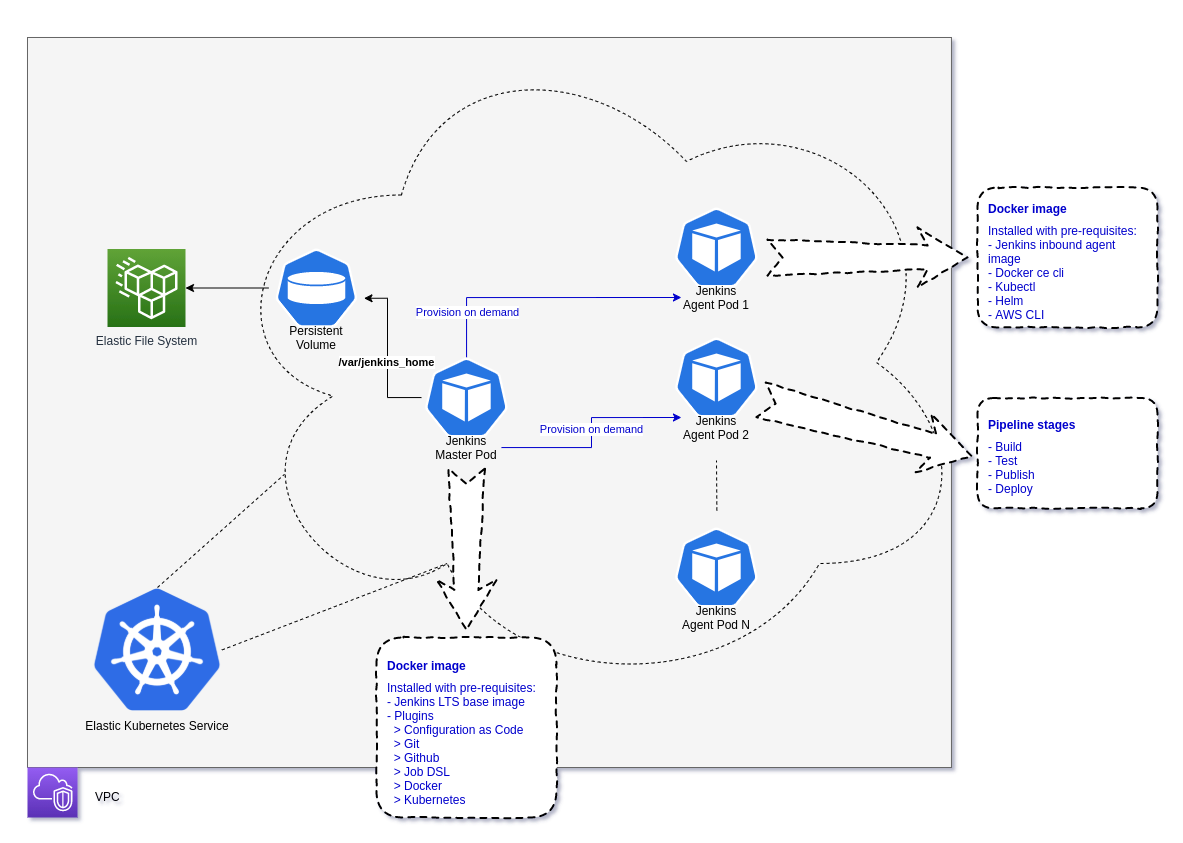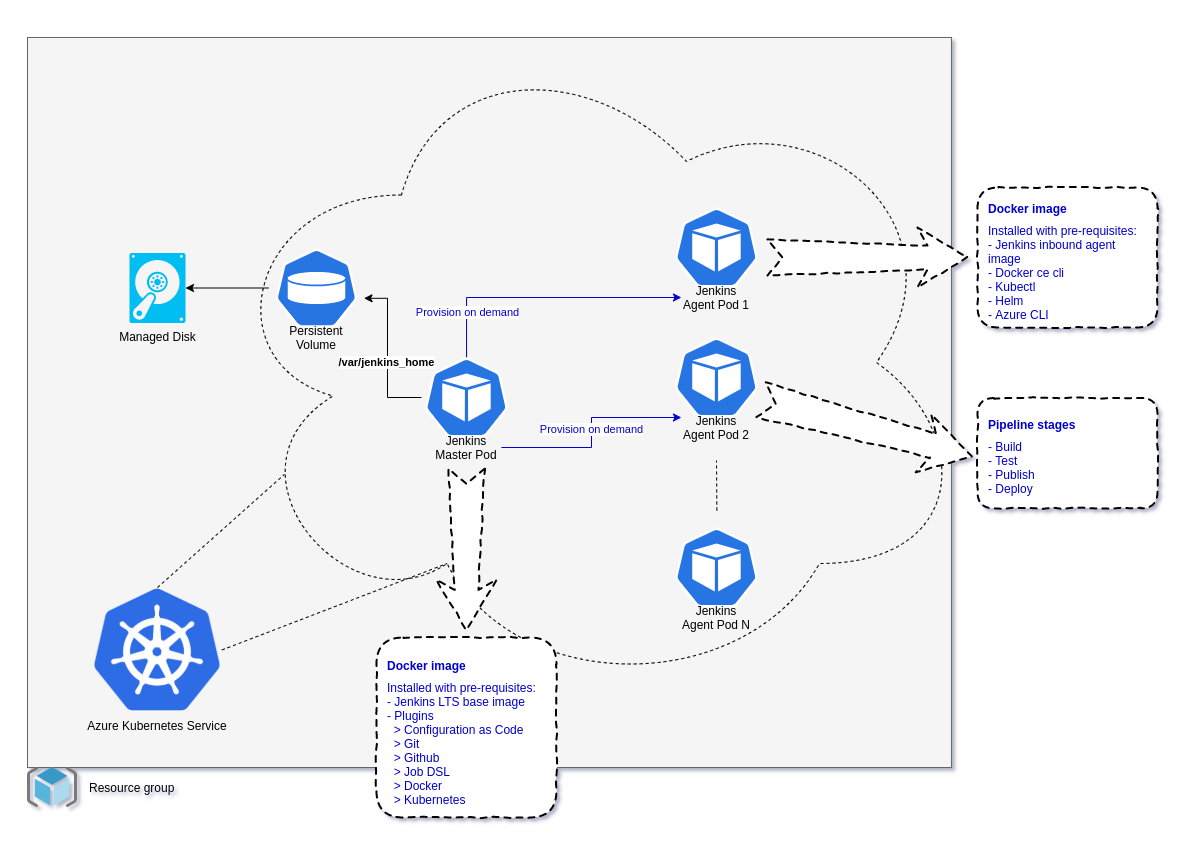fortosi
fórtosi as pronounced in greek means loading or shipping.
This kubernetes extension is meant to address a fundamental requirement of any project team running their applications on kubernetes - which is to quickly provision CI/CD pipelines (on demand) for their various private/public GitHub projects/organisation using simple kubectl commands. Basically, implementing the concept of No Ops. It is also:
- Agnostic of cloud platform, be it AWS (EKS) or Azure (AKS) owing to wonders of kubernetes and,
- Agnostic of application technology framework and currently demonstrates aspnetcore and nodejs builds happening from the exact same pipeline definition.


Deployment architecture in AWS
- Elastic Kubernetes Service (EKS) with a managed node pool for running Jenkins and Fargate Node Profile for running application pods in serverless node pool.
- Elastic File System (EFS) for storing Jenkins home directory.
NOTE:
- EKS with Fargate is available only in selected regions: https://docs.aws.amazon.com/eks/latest/userguide/fargate.html

Deployment architecture in Azure
- Azure Kubernetes Service (AKS) for running Jenkins and application pods.
- Managed Disk for storing Jenkins home directory.

Install basic and cloud pre-requisites on Ubuntu or Windows Subsystem for Linux aka WSL2
- Update and upgrade apt packages:
sudo apt-get update
sudo apt-get full-upgrade -y
- Install basic pre-requisites:
sudo apt-get install -y \
apt-transport-https \
ca-certificates \
curl wget unzip tar openssl git ssh nano \
lsb-release \
gnupg-agent gnupg2 \
software-properties-common
- Install yq:
sudo add-apt-repository ppa:rmescandon/yq
sudo apt-get update
sudo apt-get install yq -y
- Install docker ce on Ubuntu (not on WSL2):
curl -fsSL "https://download.docker.com/linux/$(lsb_release -is | tr -td '\n' | tr [:upper:] [:lower:])/gpg" | sudo apt-key add -
echo "deb [arch=amd64] https://download.docker.com/linux/$(lsb_release -is | tr -td '\n' | tr [:upper:] [:lower:]) \
$(lsb_release -cs | tr -td '\n' | tr [:upper:] [:lower:]) stable" | sudo tee -a /etc/apt/sources.list.d/docker.list
sudo apt-get update
sudo apt-get install -y docker-ce containerd.io
- Install docker ce ‘client’ on WSL2 after installing ‘docker for windows’ from here:
curl -fsSL "https://download.docker.com/linux/$(lsb_release -is | tr -td '\n' | tr [:upper:] [:lower:])/gpg" | sudo apt-key add -
echo "deb [arch=amd64] https://download.docker.com/linux/$(lsb_release -is | tr -td '\n' | tr [:upper:] [:lower:]) \
$(lsb_release -cs | tr -td '\n' | tr [:upper:] [:lower:]) stable" | sudo tee -a /etc/apt/sources.list.d/docker.list
sudo apt-get update
sudo apt-get install -y docker-ce-cli
- Install kubectl:
sudo apt-get update && sudo apt-get install -y apt-transport-https gnupg2
curl -s https://packages.cloud.google.com/apt/doc/apt-key.gpg | sudo apt-key add -
echo "deb https://apt.kubernetes.io/ kubernetes-xenial main" | sudo tee -a /etc/apt/sources.list.d/kubernetes.list
sudo apt-get update
sudo apt-get install -y kubectl
- Install helm:
curl -fsSL https://raw.githubusercontent.com/helm/helm/master/scripts/get-helm-3 | sudo bash -
# verify
helm version
- Install aws tools:
# install aws cli
curl "https://awscli.amazonaws.com/awscli-exe-linux-x86_64.zip" -o "awscliv2.zip"
unzip awscliv2.zip
sudo ./aws/install
rm -rf ./aws awscliv2.zip
Or,
- Install azure tools:
# install azure cli
curl -sL https://aka.ms/InstallAzureCLIDeb | sudo bash
Automatic installation of jenkins on kubernetes
- Option 1: Deploy cloud kubernetes cluster and related resources by following the instructions in infra/aws/README.md or infra/azure/README.md
- Option 2: Or, bring your own elastic kubernetes service cluster along with an elastic file system having the access point in the same VPC as EKS and a security group allowing efs port ‘2049’ from VPC.
- Option 3: Or, bring your own azure kubernetes service cluster along with a managed disk on which the aks identity has contributor permissions.
- Thereafter, follow these instructions:
# change to the directory where you want fortosi extension to be installed like, user's home (~)
cd ~
# preset sudo password in terminal session, so that the there are no more prompts for sudo password in further steps
sudo echo hi
# install the kubectl extension - fortosi
NOTE:
- By default, it will create a git clone directory - kubernetes-extension-fortosi
- But, if you have cloned it already then specify your git clone path as an argument to installer
curl https://raw.githubusercontent.com/ankursoni/kubernetes-extension-installers/master/fortosi-installer.sh | sudo bash
# or,
curl https://raw.githubusercontent.com/ankursoni/kubernetes-extension-installers/master/fortosi-installer.sh <YOUR_GIT_CLONE_PATH> | sudo bash
# change the ownership of the git clone directory
sudo chown -R $USER: kubernetes-extension-fortosi
# change directory to kubernetes-extension-fortosi
cd kubernetes-extension-fortosi
# prepare the auto setup script secret variables file - auto-setup-vars-secret
cp auto-setup-vars auto-setup-vars-secret
# update the secret variables file - 'auto-setup-vars-secret' like the following, where,
# - FORTOSI_GIT_CLONE_PATH is the local path for this cloned git repository
# - CONTAINER_REPOSITORY_NAME is the same as CONTAINER_REGISTRY_USER_NAME i.e. docherhub username if you are using dockerhub free tier
# - GITHUB_USER_PAT (github personal access token) can be generated from https://github.com/settings/tokens
# with all permissions set under 'repo'
# - GITHUB_ORG is your github org that contains all your projects for ci/cd requirement. Use the value 'ankursoni' for a quick demo run.
# - INIT_REPO is the git repository in your github org for the initial jenkins job creation pipeline. Use the value 'kubernetes-extension-fortosi' for a quick demo run.
# - CONTAINER_REGISTRY_USER_PASSWORD can be generated as personal access token from https://hub.docker.com/settings/security if you are using dockerhub as container registry
# - AWS_EFS_ID can be found by running the command and copying the second value from output:
# aws --region <REGION> efs describe-file-systems --query 'FileSystems[*].[Name, FileSystemId]' --output text | grep <PREFIX>-<ENVIRONMENT>-efs01
# - AZURE_MANAGED_DISK_RG is the azure resource group of managed disk of a minimum 16GB capacity
# - AZURE_AKS_RG is the azure resource group of azure kubernetes service
# - CLOUD_PROVIDER is the either aws or azure
NOTE:
- Skip filling AZURE_… variable values for AWS and vice versa.
- Make sure the value for the variable - ENABLE_LOCAL_DOCKER is set to ‘false’
FORTOSI_GIT_CLONE_PATH="/home/ankur/repo/kubernetes-extension-fortosi"
CONTAINER_REGISTRY_URL="docker.io"
CONTAINER_REPOSITORY_NAME="ankursoni"
JENKINS_IMAGE_NAME="fortosi"
GITHUB_USER_NAME="ankursoni"
GITHUB_USER_PAT="<removed as secret>"
GITHUB_ORG="ankursoni"
INIT_REPO="kubernetes-extension-fortosi"
ENABLE_LOCAL_DOCKER=false
CICD_NAMESPACE="jenkins"
CONTAINER_REGISTRY_USER_NAME="ankursoni"
CONTAINER_REGISTRY_USER_PASSWORD="<removed as secret>"
AWS_REGION_CODE="ap-southeast-2"
AWS_EKS_NAME="fortosi-demo-eks01"
AWS_EFS_ID="fs-cb25ebf3"
AZURE_MANAGED_DISK_RG="fortosi-demo-rg01"
AZURE_MANAGED_DISK_NAME="fortosi-demo-md01"
AZURE_SUBSCRIPTION_ID="794a7d2a-565a-4ebd-8dd9-0439763e6b55"
AZURE_AKS_NAME="fortosi-demo-aks01"
AZURE_AKS_RG="fortosi-demo-rg01"
CLOUD_PROVIDER="aws"
# execute jenkins installation
kubectl fortosi auto-setup-vars-secret
# access jenkins portal by browsing http://localhost:8090
Refer to configuration guide for proper usage: docs/CONFIGURATION-GUIDE.md
Build jenkins docker images and run locally (optional)
- Build jenkins agent docker image by following the instructions in jenkins/agent/README.md
- Build jenkins master docker image and run locally by following the instructions in jenkins/master/README.md
Learn how to deploy to azure kubernetes service cluster manually (optional)
- Deploy azure kubernetes cluster and related resources by following the instructions in infra/azure/README.md
- Build and publish jenkins agent docker image by following the instructions in jenkins/agent/README.md
- Build and publish jenkins master docker image by following the instructions in jenkins/master/README.md
- Deploy jenkins master pod and services by following the instructions in jenkins/master/helm/README.md